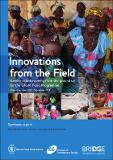| dc.contributor.author | Brody, Alyson | |
| dc.contributor.author | Hossain, Naomi | |
| dc.contributor.author | Oswald, Katy | |
| dc.contributor.author | Smith, Sally | |
| dc.coverage.spatial | Guatemala | en |
| dc.coverage.spatial | Kenya | en |
| dc.coverage.spatial | Lesotho | en |
| dc.coverage.spatial | Malawi | en |
| dc.coverage.spatial | Senegal | en |
| dc.date.accessioned | 2015-10-09T08:18:36Z | |
| dc.date.available | 2015-10-09T08:18:36Z | |
| dc.date.issued | 2015 | |
| dc.identifier.citation | Brody, A., Hossain, N., Oswald, K. and Smith, S. (2015) Innovations from the Field: Gender mainstreaming from the ground up for the World Food Programme, Brighton: IDS. | en |
| dc.identifier.uri | https://opendocs.ids.ac.uk/opendocs/handle/20.500.12413/7089 | |
| dc.description.abstract | Food and nutrition security and gender equality are closely linked and mutually constitutive. The fact that women and girls are among the most undernourished in the world and are often hardest hit by food insecurity underlines this.
Women’s productive labour and unpaid care work is central to the production, preparation and provision of food. Yet their ability to feed themselves and their families is persistently undermined by institutionalised gender biases in access to resources, markets, social services and social protection, as well as socio-cultural norms which prioritise the nutrition of men and boys and limit women’s decision-making power.
Acknowledging this situation the WFP has, amongst other activities, entered into a learning partnership with the Institute of Development Studies (IDS). The premise for the ‘Innovations from the Field’ programme is that WFP staff and partners at the country level are often adopting innovative practices which respond to, and deal effectively with, local gender realities and priorities, but these are rarely shared.
Taking a ‘bottom-up’ learning approach to gender mainstreaming will allow successful innovations to be captured, shared and embedded across the
organisation. In this first phase of the programme, IDS has facilitated a process
of ‘participatory action learning’ in five WFP Country Offices: Guatemala, Kenya, Lesotho, Malawi and Senegal. This has enabled staff to reflect on, explore, document and share good practices for gender-sensitive food security programming. It has also allowed wider reflection on current barriers to effective gender mainstreaming in WFP and how they could be overcome. This report summarises the learning so far. | en |
| dc.publisher | World Food Programme, Institute of Development Studies and BRIDGE | en |
| dc.rights.uri | http://www.ids.ac.uk/files/dmfile/IDSOpenDocsStandardTermsOfUse.pdf | en |
| dc.subject | Development Policy | en |
| dc.subject | Gender | en |
| dc.subject | Nutrition | en |
| dc.subject | Participation | en |
| dc.title | Innovations from the Field: Gender mainstreaming from the ground up for the World Food Programme | en |
| dc.title.alternative | Phase One: June 2013 – September 2014 | en |
| dc.type | Other | en |

